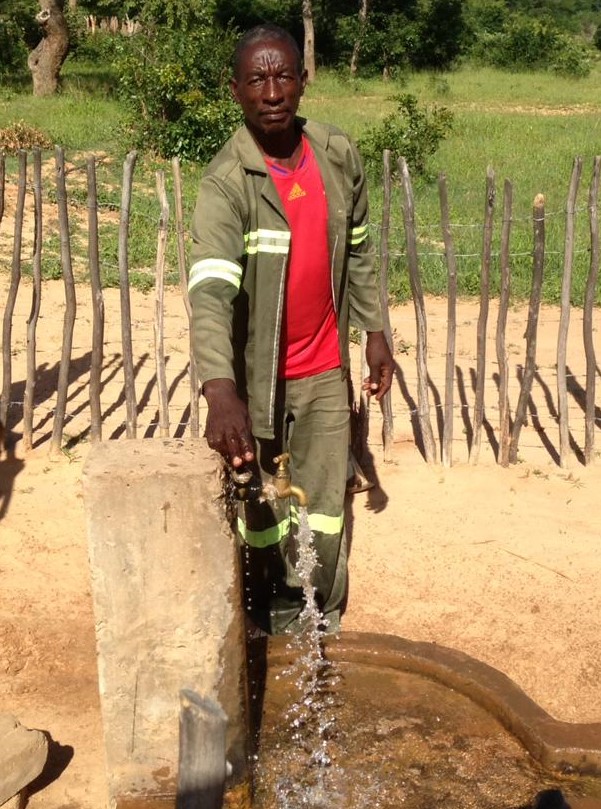Singeni villagers, deep in the heart of Nkayi District in Matabeleland North are now proud owners of a piped water scheme and solar-powered system that has improved their lives in the community.
The piped water scheme has caused huge ripple effects that have lessened the burden on villagers including schoolchildren, attracted teachers and improved livestock health.
Using a solar-powered pump system, nine taps have been installed at the eastern side of the village including Singeni Secondary School, removing the burden of walking long distances as the water taps are located within a manageable radius from the nearest households.
The western area of Singeni Village receives water from a borehole.
According to the 2019 Zimbabwe Vulnerability Assessment (ZimVAC) Report, Nkayi is one of the hardest-hit districts in the country, which prompted a response from the Matabeleland Enhanced Livelihoods, Agriculture and Nutrition Adaptation (MELANA) project sponsored by the Zimbabwe Resilience Building Fund (ZRBF).
MELANA noted that absorptive, adaptive and transformative capacities of Nkayi left locals vulnerable to shocks and stresses caused by drought, dry spells, animal diseases, crop pests, fire outbreaks, floods, wildlife conflict, environmental degradation among other challenges.
In a visit to Singeni Village, Wednesday, CITE learnt the villagers, with assistance from ZRBF MELANA, went through resilience capacity training, as they were taught how to address drought shocks and minimise its negative impact on their development.
In their engagement with MELANA, Singeni village made up of 117 households, identified provision of water supply and creating the infrastructure for dip tanks as their top priorities in order to build their resilience.
Chairperson of the Diptank at Singeni Village, Enock Moyo, said villagers used to walk more than 10 kilometres to access the nearest dip tank while women walked further to fetch water.
“As a result, there was congestion at the nearest village as our people also wanted to vaccinate their livestock. Due to those factors, some villagers ended up not going to the dip tank, exposing more livestock to diseases,” he said.
“We stayed many years without dipping our cattle, infact we stopped in 2013, continued briefly in 2015 but stopped again.”
Moyo highlighted villagers started working with ZRBF MELANA in 2017 and in 2018 they received materials to start constructing the dip tank.
“MELANA contributed 70 percent of the funds and we the people had to settle the rest. Stage two of the project included drilling for water while the solar system was powered,” he said.
Ever since the dip tank was created, cattle deaths reduced significantly.
“The community has 1 702 cows that now use the dip tank,” Moyo noted.
“Each villager contributes $10 to buy the chemicals for the dip tank. We either ask MELANA representative to buy on our behalf in Bulawayo then we reimburse them or we ask an official from the veterinary office. One litre of the chemical costs $540 and for each dipping session we use three to four litres.”
Moyo said sometimes villagers contributed five gallons of sorghum each, instead of forking out money, which they brewed into beer and sold to fundraise for the chemicals.
“We have also employed some locals to guard the infrastructure and each household contributes $2 that goes towards the upkeep of the guards. We also collect funds to maintain the structure where each household contributes a $1 each,” the chairperson said.
Female community members concurred that due to the piped water scheme, locals were able to access clean safe water.
“Women used to rush frequently to Mbuma Hospital with children suffering from diarrhoea but now those visits have reduced,” said Sithabiso Dube treasurer of the dip tank project.
She said women had also started four nutrition gardens, where they plant vegetables, tomatoes, onions and cabbages.
“School children who use a bush boarding at Dlawa also feed on the produce especially when writing exams,” Dube noted.
However, fellow community members lamented the primary school was yet to receive water as they were now in the process of ‘stretching’ pipes from the main water source.
Ward 25 councillor, Elmon Sibanda, praised MELANA for engaging Singeni villagers and teaching them how to be self-sustainable and resilient in face of drought.
Village Head, Nathaniel Ncube concurred he was pleased with the level of ownership exhibited by Singeni villagers.
“People are now aware of what to do and have become responsible for these projects. They are also able to support their families and diversify their livelihood,” he said.
In an interview at her office at Nkayi centre, District Development Administrator, (formerly District Administrator), Matilda Mlotshwa,
confirmed Nkayi was one of the poorest districts in Zimbabwe.
“Nkayi has a population of less than 120 000 locals comprising of 30 administrative wards, 156 villages and six chiefs. Water tables in Nkayi are very low resulting in costly drilling of boreholes and digging of wells while existing boreholes and deep wells have run dry resulting in many people walking long distances.
“The soil type we have here is known as Kalahari Sands and are generally characterised by low fertility and poor water capacity, making the district unsuitable for most forms of cereal production,” she said.
Nkayi, alongside Bubi, Umguza and Umzingwane (in Matabeleland South) are the four districts that have benefitted from MELANA with funding from ZBRF.
The ZRBF is a long-term development initiative supported by the Ministry of Lands, Agriculture, Water and Rural Resettlement, with funding from the European Union, the Embassy of Sweden and the UK Department for International Development (DFID ) whose funds are administered by the United Nations Development Programme (UNDP).
ZRBF’s overall objective is to contribute to the increased capacity of communities to protect developmental gains in the face of recurrent shocks and stresses enabling them to contribute to the economic development of Zimbabwe.

